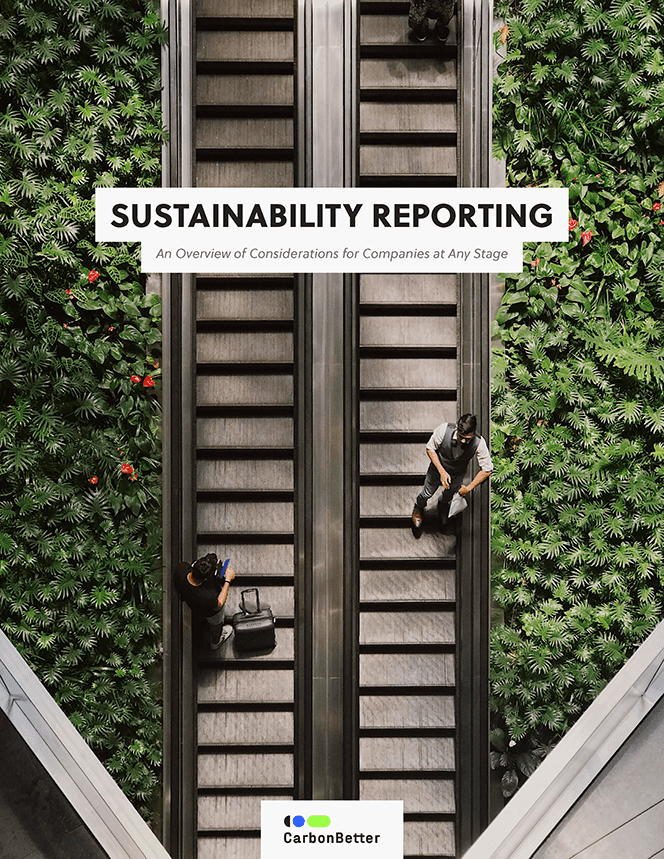EU’s CSRD: Implications for US Businesses


As climate-related disclosure and mitigation requirements continue to evolve, understanding the latest regulatory landscape is essential for US companies. In this webinar, we cut through the jargon to provide clear insights into emerging climate-related requirements, breaking down two key federal proposals and one EU regulation impacting some US-based companies. Join us to stay informed and prepared for what’s ahead in climate compliance.
The new EU rule will subject 49,000 companies to new reporting requirements—including some US businesses.
The Corporate Sustainability Reporting Directive (CSRD), which was passed by the European Union (EU) Council on November 28, 2022 to replace the Non-Financial Reporting Directive (NFRD), is the European Commission’s (EC) first common reporting framework focused on non-financial Environmental, Social, and Governance (ESG) data and will require companies to disclose how sustainability issues affect their organizations and the overall environment. The new rule will affect nearly 50,000 companies—which is 4x the number of companies that were affected under the NFRD—and is expected to go into effect for the 2024 reporting year for some companies, with first disclosure submissions due in 2025. Some United States (US)-based companies will also be subject to the rule.
Note: The European Commission (EC) recently published a draft delegated act containing the first set of European Sustainability Reporting Standards (ESRS) under the CSRD, proposing several changes to the directive. This post was updated to reflect these changes.
The June 2023 proposed updates would extend phase-in times for smaller companies and first-time reporters, introduce materiality assessments for sustainability factors, and allow for the omission of certain disclosures for smaller companies. These possible changes aim to ease the transition to the new reporting requirements, allowing companies to focus on sustainability factors that are most relevant to their businesses, and providing additional time for companies to prepare their disclosures. A public comment period is open until July 7,2023 to provide feedback on these proposed changes. The EC hopes to adopt the delegated draft in July of this year, with the standards going into effect at the start of 2024.
CSRD Timeline
- April 21, 2021: Initial EU Directive proposals issued
- February 22, 2022: Targeted revisions to the EU Directive proposals issued
- June 21, 2022: European legislative bodies reached a provisional agreement on the CSRD
- November 10, 2022: EU Parliament adopted the CSRD proposal
- November 28, 2022: EU Council adopted the CSRD
- January 1, 2024: the CSRD first goes into effect, with first reports due in 2025
CarbonBetter helps organizations take proactive steps to ensure compliance with potential new regulations, including the CSRD, the proposed SEC rule, and the proposed federal supplier rule. Reach out today to get started.
Contact UsThe CSRD Will Replace the NFRD
The purpose of the CSRD is to help investors, consumers, and other key stakeholders evaluate companies’ non-financial performance by revising and strengthening the existing requirements of the NFRD. This intent is similar to the proposed US Securities and Exchange Commission (SEC) rule, which would affect public companies in the US and aims to improve the accuracy, reliability, consistency, and integrity of climate-related disclosures that investors can use to make sound investment decisions.
The NFRD will ensure that companies report reliable and comparable sustainability information that investors and other stakeholders need. Notably, the CSRD will require mandatory disclosure of certain requirements, whereas the NFRD did not.
The CSRD extends the scope of the reporting obligation to more companies, requires third-party audits of reported information, introduces more detailed reporting requirements, and updates the format for the reported information.
Here are the key changes introduced by the CSRD:
| Requirement | NFRD (old) | CSRD (new) |
| Companies that are required to report | Large public interest companies with more than 500 employees (companies listed in the EU regulatory market, banks, insurance companies) | Listed companies and all large companies that meet at least two of the following criteria: – More than 250 employees (up from 250) – More than €40 million turnover – More than €20 million in total assets |
| When do the requirements go into effect? | 2019 | 2024 |
| How many companies will need to comply with the requirements? | 11,600 companies | 49,000 companies |
| Scope of the requirements | Environmental protection Social responsibility and treatment of employees Human rights Anti-corruption and bribery Diversity on company boards | NFRD requirements plus: Disclosure of information about intangibles (including social, human and intellectual capital) Additional forward-looking information Reporting that is consistent with the Sustainable Finance Disclosure Regulation (SFDR) and the EU Taxonomy Double-materiality concept, which expands the consideration of sustainability beyond a company’s capital market value to include the company’s wider effects on society and the environment |
| Assurance | Not required | Mandatory |
“Reports often omit information that investors and other stakeholders think is important. Reported information can be hard to compare from company to company, and users of the information are often unsure whether they can trust it.”
THE EUROPEAN COMMISSION ON WHY there WAS a need to UPDATE THE NFRD

SUSTAINABILITY REPORTING OVERVIEW
Sustainability reporting serves as a valuable tool to achieve corporate commitments and better manage climate-related business risks. This white paper walks you through what's typically included and what should be considered.

CSRD + EU Taxonomy Alignment
The EU Taxonomy establishes a common classification system to measure which economic activities are environmentally sustainable within the context of the European Green Deal.
The EU Taxonomy exists to help scale up sustainable investments and combat the greenwashing of “sustainable” financial products. It supports companies in transitioning to climate neutrality and a sustainable economy by translating climate and environmental objectives into clear criteria to create a common language around green activities. The EU Taxonomy will ensure that companies falling under the scope of the CSRD disclose their environmental performance information and their Taxonomy-aligned economic activities.
Which Companies Are Affected?
Criteria for disclosure requirements
The following companies will have to follow the disclosure requirements laid out in the CSRD:
- Large EU companies (including subsidiaries and branches of non-EU parent companies) exceeding at least two of the following criteria:
- The latest draft proposes 750 employees on average (up from 250 employees) over the financial year
- A balance sheet total of €20 million
- A net turnover of €40 million
- Companies listed on the EU regulatory market, regardless of size
- Non-EU companies that have a turnover greater than €150 million in the EU
What does this mean for US Companies?
As noted above, US companies that have a turnover greater than €150 million in each of the past two years consecutively, or subsidiaries of US companies that are located in the EU and meet the requirements above, will have to comply with the CSRD requirements.
June 2023 Proposed Updates to the CSRD
The European Commission has published the draft delegated act containing the first set of European Sustainability Reporting Standards (ESRS) under the CSRD, proposing several changes aimed at easing the burden on smaller companies and first-time reporters. These proposals, which are not yet adopted, include:
- Extended Phase-In Times for Small Businesses: The European Commission has proposed extended phase-in times for some key sustainability factors such as Scope 3 value chain emissions.
- Materiality Assessments for Sustainability Factors: All companies are now allowed to focus specifically on material sustainability factors. This means companies can focus their reporting on sustainability factors that they consider material to their businesses.
- Omission of Certain Disclosures for Smaller Companies: Companies with fewer than 750 employees in the first year that they apply the standards can omit Scope 3 emissions data as well as "own workforce" disclosures, which include topics such as working conditions and equal treatment.
- Additional Year for Disclosing Information: Companies are given an extra year to disclose information on anticipated financial effects related to non-climate environmental issues and on some "own workforce" data points.
- Voluntary Disclosures: Some disclosures are now voluntary, including biodiversity transition plans, and measures to ensure interoperability with global standard-setting initiatives such as the International Sustainability Standards Board (ISSB) and Global Reporting Initiative (GRI), along with other technical modifications.
- Cost Reductions: The EC anticipates cost reductions during the phase-in period of nearly €1.2 billion, and €230 million on an annual basis, compared to EFRAG’s proposals.
- Criticism of the New Proposals: Sustainable finance groups have warned that the new proposals could negatively impact the effectiveness of the CSRD. For instance, Eurosif's statement indicated that it was "very concerned" with the changes, which it called "a significant setback in ambition compared to the final recommendations published by EFRAG," and particularly criticized the materiality assessments amendment.
CSRD (EU) vs. the Proposed SEC Climate Disclosure Rule (US)
The CSRD and the proposed SEC Climate Disclosure Rule are both aimed at standardizing and improving access to corporate sustainability disclosure information for investors. While there are many similarities between the already-passed CSRD and the proposed SEC Climate Disclosure Rule as it’s currently written, there are critical differences as well.
Below are some of the similarities and differences to keep in mind for US-based companies that may be affected by either of these rules (or both), now or in the future.
Similarities:
- Both make climate disclosure mandatory for certain companies.
- The goal for both is to make the reporting process more transparent and standardized.
Differences:
- Notably, the CSRD has been passed into law and is set to go into effect for the 2024 reporting year, with the first submissions coming in 2025. In comparison, the SEC Climate Disclosure Rule is only a proposed rule at this stage.
- The CSRD affects companies operating in the EU (including some US businesses and/or their subsidiaries), whereas the SEC Climate Disclosure Rule would affect publicly traded US businesses.
- The proposed SEC climate rule would require affected companies to report their Scope 1 and Scope 2 greenhouse gas (GHG) emissions and climate-related risks that could potentially affect their financial stability. By contrast, the CSRD disclosures will require companies to report information on their business model and strategy, risks, targets and progress, and due diligence processes with regard to sustainability matters, including both qualitative and quantitative data about these issues. Crucially, CSRD uses “double materiality,” which means companies have to report how sustainability issues affect their business as well as their business’ impact on people and the environment.
When will the CSRD Go Into Effect?
The chart below shows when the CSRD will go into effect based on company type:
| Company Type | Effective Date | Year of First Report |
| Companies subject to the existing NFRD | January 1, 2024 | 2025 |
| Large companies not currently subject to the NFRD* | January 1, 2025 | 2026 |
| Small and medium-sized companies listed on the EU-regulated market** | January 1, 2026 | 2027*** |
| Non-EU parent companies**** | January 1, 2028 | 2029 |
** All companies listed on the EU-regulated market that don't meet the criteria of a large business, as defined previously in this post.
*** Small and medium-sized businesses can opt out of CSRD reporting until 2029.
**** With a net turnover of at least €150 million in each of the past two consecutive years.
CSRD Requirements
Businesses affected by the CSRD will be required to file an annual report using the CSRD's forthcoming sustainability taxonomy on how sustainability influences their business, as well as the company's impact on people and the environment. The CSRD requirements are as follows:
- Prepare and submit a report: A company's first CSRD report will be due in early 2025 based on the company's 2024 fiscal year environmental performance.
- Track and disclose the required information: CSRD reports must include management commentary and data on a company's:
- Materiality process to select material ESG themes, topics, risks, and focus areas
- Sustainability and ESG performance targets, goals, and progress
- Sustainability risks (including climate change) affecting the company, as well as the organization's operating impacts on society and the environment
- How sustainability and ESG risks could impact or are impacting operating results and business performance
- Environmental protection policies and actions
- Social responsibility and treatment of employees
- Respect for human rights
- Anti-corruption and bribery practices
- Corporate board diversity
- Important social, human, and intellectual capital
- Digital data and tagging: Companies must prepare their financial statements and management statement in XHTML format in accordance with the European Single Electronic Format (ESEF) regulations and the EU sustainability taxonomy, then digitally ‘tag' their reported sustainability information according to a digital categorization system specified by the CSRD regulation.
- Third-party assurance: Organizations reporting under the CSRD will also be required to seek "limited" assurance of the sustainability information they disclose from a neutral, trusted, and experienced third party who reviews the data. "Limited" assurance is less strict than a financial audit but still requires working with an independent sustainability reporting partner organization or auditor.
EFRAG Project Task Force
The European Financial Reporting Advisory Group (EFRAG) has been charged with helping to develop further disclosure requirements and recently published exposure drafts of the Electronic Subcontracting Reporting System (ESRS) that will inform further obligations under the CSRD. The ESRS Exposure Drafts (EDs) prepared by the EFRAG Project Task Force on European Sustainability Reporting Standards (EFRAG PTF-ESRS) were open for comment from April 30 – August 8, 2022. The group amended the draft based on the comments received, and the draft is now under review by the European Commission. The European Commission will consult EU bodies and Member States on the draft standards before adopting the final standards as delegated acts in June 2023, followed by a scrutiny period by the European Parliament and Council.
Conclusion
If your company is affected by the upcoming CSRD regulations, the right sustainability partner will be critical in meeting the requirements set out in the directive. CarbonBetter helps organizations navigate the complexities of voluntary and mandatory climate-related efforts, including the CSRD, the proposed SEC rule, and the proposed federal supplier rule. Reach out today with questions or to get started.
Yes, if they meet the criteria for a “large” company under the rule and operate in the EU. The Corporate Sustainability Reporting Directive (CSRD) affects large companies operating in the EU (including some US businesses and/or their subsidiaries). If you are unsure whether or not your organization will be subject to the new rule, contact us—we can help.
Yes, for companies that meet the criteria of a “large” company operating in the EU. The requirements laid out in the Corporate Sustainability Reporting Directive (CSRD) are mandatory for all large businesses operating in the EU, including some subsidiaries/branches of US companies, as well as companies listed on the EU regulated market.
The NFRD and CSRD are both EU directives for the documentation of non-financial data. The CSRD is an improved version of the NFRD, requiring mandatory disclosure and third-party auditing, where the NFRD did not, and affecting 49,000 organizations compared to the 11,000 organizations affected under the NFRD.



